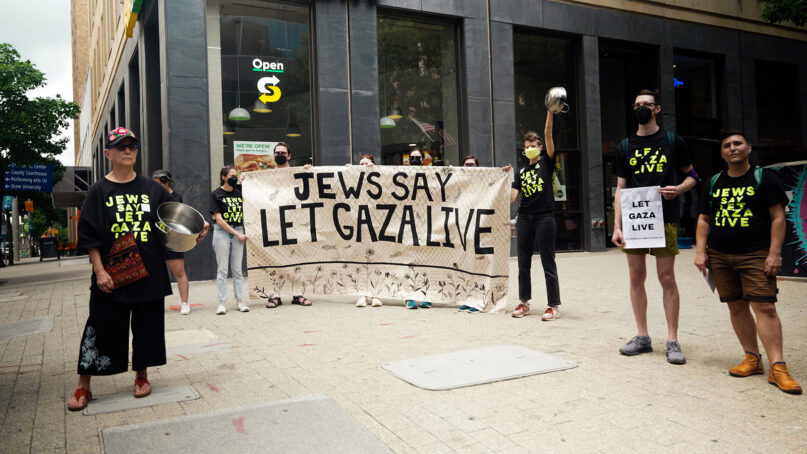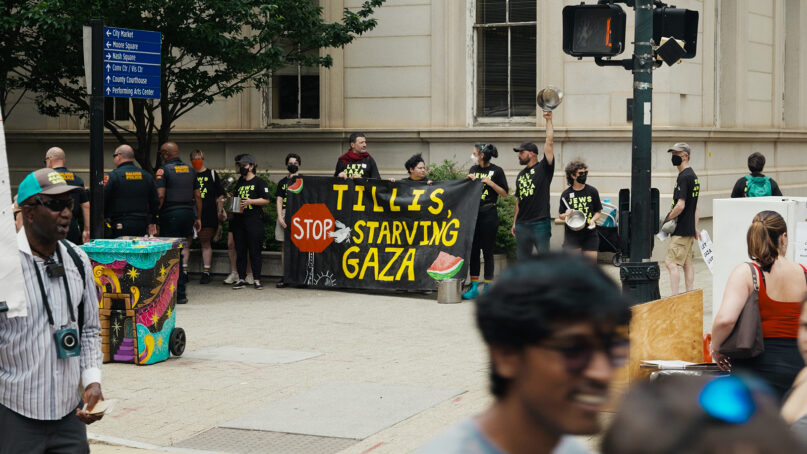(RNS) — This Friday (June 13), Yehoshua Pinson, an Israeli American Jew living in Durham, North Carolina, plans to fast for 24 hours.
Friday is not one of the six fast days called for in the Jewish liturgical calendar.
Pinson is fasting as a statement. He wants to call attention to starvation among Palestinians as Israel continues to restrict food aid into Gaza.
“We have to bring humanity to people so that they can feel in their hearts what’s going on and that it needs to be stopped,” said Pinson, 44, a personal trainer who opened Jerusalem’s first CrossFit gym before leaving Israel for the U.S. last year. “I don’t know if this is gonna make it happen, but if it’s another millimeter of progress, then that’s what we’ll do.”
Pinson is a member of the Triangle chapter of Jewish Voice for Peace, which on Saturday launched a solidarity fast in which members take turns fasting for 12 or 24 hours to call attention to the hunger gripping Gaza even after Israel partially lifted a three-month blockade on aid. There is no end date to the fast but it will go “until the food is let in,” according to JVP Triangle’s website.
The rolling Stop Starving Gaza fast is gaining traction among various JVP chapters around the country, including in Providence, Rhode Island, and Detroit. In North Carolina, members of the newly formed Charlotte and Asheville JVP chapters are also taking part.

And in Chicago, five hunger strikers will be starting an indefinite water-and-electrolytes-only fast on June 16.
Separately, more than 20,000 U.S. Jews, including nearly 727 rabbis and cantors, have signed on to a petition called “Jews for Food Aid for People in Gaza.” The petition’s motto “If there is a hungry person, one must feed them,” a saying from the Jewish code of law, will be flashed on half a dozen New York City electronic billboards beginning Friday.
“This is a long-standing Jewish imperative,” said Rabbi Shawn Zevit of Mishkan Shalom, a Reconstructionist synagogue in Philadelphia referring to the admonition to feed the hungry. “It doesn’t feel like, hey, let’s create a new category or mitzvah.”
Mishkan Shalom is one of a dozen congregations that have dedicated this weekend’s Shabbat to food aid.
From March to May, Israel blocked all food and aid from entering Gaza, a move it said was aimed at pressuring Hamas. It then allowed a new, Israel-U.S.-funded organization, the Gaza Humanitarian Foundation, to begin delivering food aid. But the GHF has been mired in dysfunction. The Israeli army has killed dozens of Palestinians near aid distribution centers, and many aid trucks have been looted. The foundation has had to temporarily halt distribution and scale down its operations.
RELATED: Johnnie Moore, prominent pro-Israel evangelical, named chair of Gaza aid group
Meanwhile, the plight of Palestinians is rapidly worsening. A report last month from the United Nations Children’s Fund found that 71,000 children are threatened by acute malnutrition.
Many American Jews on the left are appalled, at both Israel and the U.S., for allowing the starvation to continue.
“It violates everything it means to be humane as a Jewish value,” said Tema Okun, a longtime member of Jewish Voice for Peace’s Triangle chapter. “That my tax dollars are being used to create that level of suffering is almost unbearable to me.”
Okun, who is in her 70s, is not fasting but she is among a group of JVP supporters working on the fast’s ultimate goal: trying to press Sen. Thom Tillis, a North Carolina Republican and co-chair of the Senate Human Rights Caucus, to support Senate Bill 898 that would restore funding for the United Nations Relief and Works Agency and to pressure Israel to allow the group to resume its role in aid distribution. Israel has refused to allow UNRWA to work in the enclave, accusing the group of anti-Israeli bias.
A Senate resolution calling for the urgent delivery of humanitarian aid to Gaza has also been introduced.

JVP’s Triangle chapter is also working to get other faith communities to commit to its rolling fast. So far, Makom, an anti-Zionist congregation based in Durham, has invited its members to take up the fast.
Rabbi Noah Rubin-Blose said the fast is a powerful form of action in and of itself. But it’s also a Jewish practice.
“There’s a Jewish tradition of fasting in times of great communal and spiritual distress, so I see this as being in that tradition as well,” Rubin-Blose said.
Sandra Korn, a JVP leader who was among the first to take on the fast, said she did it as a way to honor her own relatives who died in the Holocaust. But ending hunger in Gaza should be a universal calling.
“This is not just a Jewish and Arab issue,” Korn said. “It’s a human issue.”
RELATED: Christian activists and veterans start 40-day fast for Gaza
Original Source: